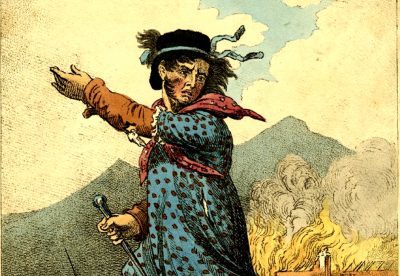The early nineteenth century brought drastic change to manufacturing. As the Industrial Revolution moved into full swing, factories and industries boomed and there was a sharp increase in jobs.1 Although many people in England were adapting to this industrial lifestyle, one group, known as the Luddites, showed resistance to the movement toward the mechanization of labor. The Luddites tried to resolve this by demolishing these modern machines, but ended up dispersing after government intervention.

Prior to the Industrial Revolution, the production of things was largely controlled by guilds. Guilds were organizations comprised of skilled artisans who dedicated their entire lives to craftsmanship. It took great learning, skills, and experience for guild members to manufacture their products. Because these people had to learn the entire process of crafting goods like textiles, it was a process that required years of training. The Shearers Guild, for example, which labored at the process of finishing pieces of woolen textiles, were among some of the most prestigious guilds in England in the late eighteenth and early nineteenth centuries.2

When the Industrial Revolution took off, there were startling contrasts between the work of guilds and the kind of work taking place in the factories. Unlike guilds, factory owners hired unskilled and inexperienced people, commonly children and women, and had them attending to hazardous machines for long periods of time. As opposed to a single guild member working on the entire process of textile making, often with years of experience in such production, a factory worker merely attended to the needs of his or her machine, changing empty bobbins of thread or making sure the machine had plenty of raw cotton for its work. The rhythm of work within the guilds tended to be flexible and free in comparison with factory work. Factory workers, on the other hand, faced overwhelming numbers of rules, and were constantly monitored.3
Among those affected by the rise of factories were the guild workers, who saw factory labor as unacceptable. Various guilds protested in various regions. Guild workers living in the Midlands counties such as Nottinghamshire, Derbyshire, and Leicestershire, worked in crafts of lace making and framework-knitting. Those residing in Yorkshire tended to be woolen guild workers. Finally, those who lived around Manchester were members of the cotton weavers guild. In 1811, these guilds started to take matters into their own hands against the production of factory-made products by unskilled workers. These protesters began in the Nottinghamshire village of Arnold. They were from the framework-knitters guild, and they broke into shops in order to take away jack wires that were essential to wide knitting frames. The following month, the frames themselves were destroyed by the protesters, now calling themselves Luddites. Several factors that led to the protests involved the restriction of looms that a weaver could own, as well as the creation of “cheap shoddy material” from the wide stocking frames. Other protester began calling themselves Luddites as well, such as the cloth dressers in Yorkshire called croppers. Traditionally, the croppers used a fifty-pound handheld shear to cut the nap from woven woolen cloth. With the introduction of the gig mill, the croppers felt outdated and “threatened.” The gig mill had the ability to shear woolen cloth easier with little to no experience required. And so, in 1812, the Luddites smashed the equipment in the town shops and mills of Yorkshire. It should be noted that Luddites also took part in food rioting and advocating for political reformation.4
It made the Luddites furious to see society abandoning their old traditions in favor of quick and dirty methods of production. Disguising themselves, they initially started to demolish the textile machinery, blaming that machinery as the sole reason for the radical change of their entire way of life. They often attacked in the middle of the night, making sure that they only harmed machines. Their attacks would be reminiscent of modern-day environmental activists who sabotage construction equipment. The Luddites claimed to have a leader named Ned Ludd, otherwise known as King Ludd. But who exactly was this king? He was a supposed leader who may or may not have ever existed. Historians have long debated whether King Ludd was a real person or some imaginary figure made up by the Luddites.5 Whether or not Ned Ludd existed, the Luddites saw him as a figurehead.

The Luddite attacks originated in Nottingham, England, but they steadily spread to other surrounding cities. As a result, the British government hired people to help protect the mill owner’s machinery. Things escalated in 1812 when a fight broke out between the Luddites and the guards, in which several Luddites were killed.6 Following the Luddites’ failed attempt to attack Rawfolds Mill, which resulted with the owner getting killed, the Luddite movement started to grow weak.7 Eventually, the government had to hang fourteen Luddites in 1813 to set an example to anyone else who might have considered rebelling. After that, any form of resistance from the Luddites stopped.8
As the Industrial Revolution grew exponentially, and factory labor prevailed, the way of life of the guilds gradually died out. With the introduction of mechanized production by machinery, cheap, unskilled labor came to dominate the production process in most industries. With state-of-the-art technology, who would want to go back to the slow, difficult process of production that the guilds had embraced? Ever since the British government’s intervention on behalf of the machine owners, the term Luddite has become a term of derision for those who would be ignorant obstructers of progress.
- Jerry Bentley, Traditions & Encounters A Brief Global History Volume 2 (New York: McGraw-Hill Education, 2016), 496-497. ↵
- Jerry Bentley, Traditions & Encounters A Brief Global History Volume 2 (New York: McGraw-Hill Education, 2016), 496-497. ↵
- Jerry Bentley, Traditions & Encounters A Brief Global History Volume 2 (New York: McGraw-Hill Education, 2016), 496-497. ↵
- International Encyclopedia of the Social Sciences, 2008, s.v. “Luddites,” edited by William A. Darity. ↵
- The Greenhaven Encyclopedia of Terrorism, 2007, s.v. “Luddites,” by Patricia D. Netzley. ↵
- The Greenhaven Encyclopedia of Terrorism, 2007, s.v. “Luddites,” by Patricia D. Netzley. ↵
- International Encyclopedia of the Social Sciences, 2008, s.v. “Luddites,” edited by William A. Darity. ↵
- Jerry Bentley, Traditions & Encounters A Brief Global History Volume 2 (New York: McGraw-Hill Education, 2016), 496-497. ↵



63 comments
Matthew Swaykus
We often ignore the counter-movements created as result from introducing change within the social fabric. From a change in demographics, to political momentum, to job availability, and even to changes in popular culture, this has historically and allegorically incurred some type of outrage from the generally population. This article is yet another example of this. The author describes how people are forced to dissolve the concept of being within a stable artisan guild and being forced to work in factories.
Antonio Coffee
I can see why the Luddites were angry and upset. The Industrial Revolution was changing their lives in very different and radical ways. The guild system was ingrained in society at the time and changing such a deeply ingrained system requires a lot of effort and is likely to upset people. With this said I do not agree with the way that the Luddites went about their protests. Destroying property and resorting to violence is not a good way to get what you want from society.
Danielle Slaughter
I’m not a fan of mass-manufactured, factory-made products by any means, and I love to shop ethically and benefit independent sellers and artisans in other countries. Unfortunately, living in the Western world, most of what I own has come from such a line. Despite my feelings, however, I would have to disagree with the Luddites methods of protest. Destroying machinery in the middle of the night is quite cowardly and, dare I say, a little uncivilized. As stated by others, progress stops for no one, and the Industrial Revolution needed to happen in order to advance human society. Otherwise, we’d all probably still live in small cities and villages, shearing our own sheep and waiting months for quality clothing and other goods.
Joshua Garza
This is an example that can relate to modern day of the strong 1% always having it there way and only caring about money and not the quality that goes into making the product. Secondly the sole concern of money made the people in charge oblivious to worker safety on the job. This article is still relevant today. You thing things would have changed by now.
Victoria Rodriguez
The Industrial Revolution was bound to happen. Humans are constantly evolving and building so, despite the Luddite’s wanting to stop it and the guild workers they would have to understand that they too will have to evolve. The world stops for no one. Despite craftsmanship and hand made products not being survived in the way they once were, the revolution brought better ideas and changed the way people bought, sold and in general conducting business.
Jabnel Ibarra
The march of progress stops for no one. Though the industrial revolution marked the start of the modern era and the rise of technology, there were many who were negatively affected by the rise of industry. An automated production line could only mean that skilled workers were no longer needed, replaced by a demand for workers to maintain the new machines. The scary thing about this article is that very soon we might experience something similar ourselves. The advancement of technology is very quickly producing more and more industries that are completely automated, eliminating the need for human intervention or involvement. Sooner, rather than later, many of us might find ourselves in the same predicament as the Luddites.
Noah Bolhuis
The Industrial Revolution was a great time of human advancement, but it was also a great example of human greed and manipulation of those that could not defend and stand up for themselves. Another thing that happened during the revolution was a loss of the skilled worker for the inexperienced, often underage, workers. One positive that can be taken out of the revolution, is that humanity learned from their evils, and there are now laws in the books against child labor.
Roman Olivera
Luddites are a group that I had heard of a long time ago. They were described to me a s a group of people who didn’t want to see the advancement of civilization just because they had certain skilled jobs that would not be needed after machines could make the same products. This article told a lot more in detail there motivations as a group and failed revolution to stop the industrial age. This group does remind me of a lot of activist groups today that set there agendas on things that are bound to change because the times have changed.
Luke Lopez
This was a very interesting article on the Luddites and their decline during the Industrial Revolution. The Luddites rejected the advancements of modern machines and they consequently destroyed some of these new machines. The Luddites also attacked these machines in the middle of the night, so that they would not harm anyone. Overall, this was a great article that went into great detail about the Luddites and their disgust for the mechanization of labor.
John Smith
The industrial revolution was a drastic change in lifestyle for Britain, so it’s understandable that there were factions that protested that change. I will admit that I didn’t know that the term Luddite came from the industrial revolution. I wonder if King Ludd was a real character in history, I believe that regardless we can thank this King Ludd for the term Luddite.